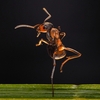If two organisms possess similar structures that serve similar functions but don't possess a common ancestor that shared that structure, then the structures are classified as
A. vestigial.
B. morphologies.
C. analogous.
D. homologous.
Answers (2)
Know the Answer?
Not Sure About the Answer?
Find an answer to your question 👍 “If two organisms possess similar structures that serve similar functions but don't possess a common ancestor that shared that structure, ...” in 📗 Biology if the answers seem to be not correct or there’s no answer. Try a smart search to find answers to similar questions.
Search for Other Answers
You Might be Interested in
Pam described two substances which participate in photosynthesis. Substance A: Combines with carbon dioxide to form sugar Substance B: Traps sunlight in green plants Which statement is correct? Substance A is water and Substance B is oxygen.
Answers (1)
What molecules occur during fermentation
Answers (1)
In addition to physical requirements, bacterial growth and multiplication also entails chemical requirements.
Answers (1)
When a stars nuclear energy runs out it dies in many ways a
Answers (1)
What is the scientific name of the Siberian wood frog?
Answers (1)
New Questions in Biology
The food web in a diverse ecosystem is
Answers (1)
How many ATP equivalents are made from convention of succinyl-CoA to oxaloacetate? Assume that re-oxidation of NADH via the electron transport chain yields the equivalent of 3 ATP, and that re-oxidation of FADH2 yields 2 ATP.
Answers (1)
A situation where friction is desirable.
Answers (1)
You discover an organism that has scaly skin and is aquatic but returns to the land to reproduce. what else would you expect to find in this organism?
Answers (1)
Which systems act on the same organs but in opposite ways? a. the central and peripheral nervous systems b. the sympathetic and parasympathetic nervous systems c. the somatic and enteric nervous systems
Answers (1)

